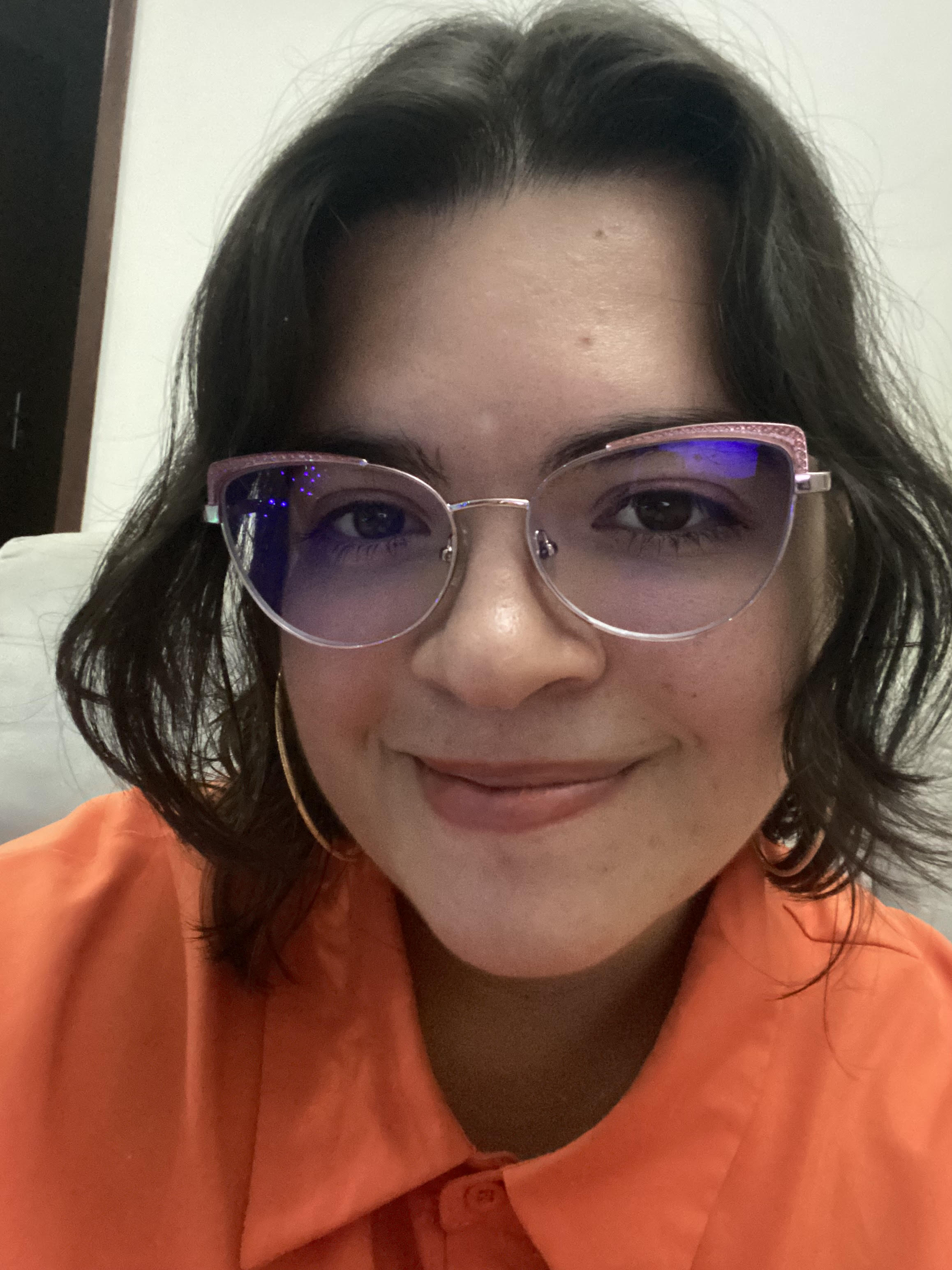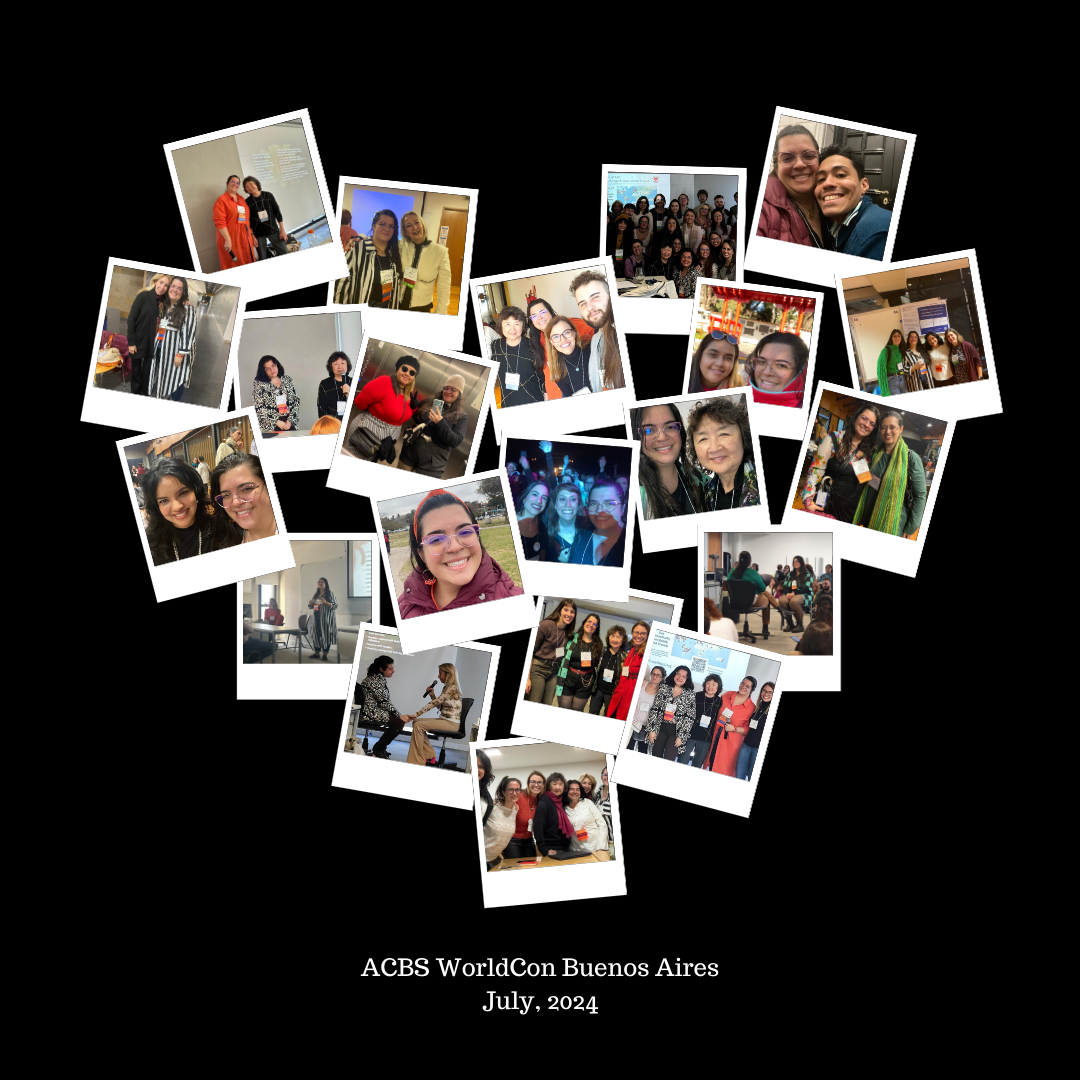Ana Katarine Santos

Could you please tell us a little about you and your background?
I’m a 29-year-old white bisexual woman from Brasília, Brazil. I’m a clinical psychologist who works with Functional Analytic Psychotherapy (FAP) enhanced by Feminist Therapy, Affirmative Therapy, Acceptance and Commitment Therapy (ACT), the Minority Stress Theory and the Relational Frame Theory (RFT).
I graduated in 2020 and began working as a therapist in 2021, but even as a student, I heard the calling to work for my community. I actually started doing it in 2019 when I watched a lecture about the Awareness, Courage and Love Global Project (ACLGP). By then, I was already in love with FAP and was thirsty of anything related to it. The professor who lectured told us about the possibility of volunteering to ACLGP and I took it. I’m part of it, still. The ACLGP quickly became one of my homes within the CBS community. It’s there I learned how to interact with people in a meaningful way, listen to more than words can say and expressing myself truthly, in a way that resonates with my heart, with who I am deeply. I embraced its mission and vision and understood that from them, I could make my own mission and vision happen.
In 2021, I founded the Brazilian FAP SIG with three other FAP therapists, two of them dear friends of mine who I admire so much. I didn’t know a thing about how to bring people together to create a community and me and them truly learned by experience. It was challenging and it still is, but inspiring and powerful. As I got closer to the Brazilian CBS community through FAP SIG and volunteering in the Brazilian ACBS events, I decided to take one step forward and in 2024, I was elected as a Member at Large in the Brazilian ACBS Board and it’s been a ride. It gave me the chance to make my voice be heard and it’s been teaching me how to see the process instead of just waiting for the results; and slowly, we’re building a stable structure for our community.
How did you become interested in CBS?
I started studying FAP while in graduation, in 2017, and I haven’t stopped since then. I also got to know ACT in the same year, but I was more inclined to devoting my time to FAP. Back then, I was still deeply involved with the Behavior Analysis community and it was in 2020, in the I Brazilian ACBS Annual Online Conference, where I got closer to the CBS community and started learning about Contextual Functionalism.
Could you tell us about your research and application interests?
I have many passions and application interests.
Due to my work in the ACLGP, the project has inspired me to help people find their voice and make their voice be listened to by the people around them. I learned that what I truly wanted to do in my clinical work and in the community work was to create safe and nurturing spaces for people to express themselves and be held, be accepted, be loved. These values are almost essential for working with LGBTQIAPN+ people, who are 70% of my clients, as relationships are an area of intense vulnerability for them, for us. I’ve been working guided by this mission for almost 4 years now.
Because of the amount of work I do for the Brazilian community, I’m interested in bringing community building knowledge to enhance FAP’s generalization strategies. Latin American Social Psychology is also a knowledge field that could contribute. The study I’ve been doing is still purely theoretical.
And when it comes to engaging in post-graduation programs, I’m inclined to start researching how FAP can be used to work with nonbinary people in order to keep creating safe spaces for them, for us as I also feel nonbinary, and start teaching professionals how to do the same, and little by little make significant changes.
Could you tell us about your experience at the World Conference this year?
It was like I had gone back to college, but with Mavis Tsai. And in another country as this was my first trip abroad.
It’s one of my comfort spaces to be around people I like, care for and admire while doing things we enjoy together. That atmosphere of watching lectures, disclosing vulnerability and being validated in workshops, discussing important matters and watching remarkable people also engage in debates and discussions was part of the comfort space we created. It was a once in a lifetime opportunity to learn from people I admire so much and get to know more people, expand my social network and strengthen the relationships I already had. All of that in a beautiful city, full of culture like Buenos Aires. I shout out to Andri, Pri, Jo, Mavis, Giulia, Gusta, Tati, Mari, João M., João H., Sil, Wes and my best friend and travel companion, Ray - Buenos Aires was this terrific experience for me mainly due to your presence.
I also faced challenges. Meeting my heroine, Mavis Tsai, and learning how to interact and relate to her as a person and not as “the co-creator of FAP” in-person was difficult, but rewarding. That relationship we had already developed online was strengthened and deepened in a way that brings tears to my eyes only by writing about it here. I also submitted and presented a paper in Buenos Aires with my dear friend and FAP Trainer, Pricila Bornholdt, that was challenging and rewarding for her and for me. It was my first time ever presenting something in an In-Person Conference. And this challenging aspect grew when I presented the Awareness, Courage and Love (ACL) workshop with dear fellow ACL Leaders: Joseuda Lopes and Pricila Bornholdt from Brazil, Giulia Martinez from Peru, Cecilia Maiojas from Uruguay, Holly Yates and Mavis Tsai from the U.S. We learned together how to lead a workshop, Jo, Mavis and Holly guiding us wisely and humbly. I also learned step by step how to lead a wor kgroup as a first author, how to increase believing in myself and in my capacity to lead. These two presentations are marked in my heart as the start of many, the seconds and thirds happening just months after the 2024 WorldCon.
Mostly, it was THE opportunity to experience and put into practice the values of diversity, equity and inclusion. The reason why I say this it’s because we have a financial reality here in Latin America that is completely different from the ones in the north hemisphere. Even with the scholarships ACBS generously offers, it’s still really expensive to travel to high cost living countries that use dollars and euros as their currency. It’s less than 50 people from Brazil, usually the same groups of people, that can afford to go to WorldCon every year. And when ACBS decided to host it in Buenos Aires in 2024, we were handed accessibility, we were able to reach out to those opportunities we didn’t have, that only a small percentage of us had. Almost 200 Brazilians went to Buenos Aires on July, 300 Argentinans were able to literally walk from their houses to the university, the only effort being made would be to take a bus. There were people from Peru, Chile, Uruguay - and from Bra zil! - that I got to know for the first time and also meet in-person when I only knew them online. The Saturday night follis and party was literally a reunion of Latin American cultures - God, we Brazilians even sang Evidências, one of our most beloved songs here.
It was beautiful and I’ll carry these memories in my heart for the many years to come.
Was there anything that stood out to you about the CBS community?
I loved to see the lack of hierarchy among the community, the great names we have in CBSs being open and receptive to the ones that wanted to meet them and exchange ideas. The way that we shared the same line to get food, go to the bathroom, how they watched our presentations because they wanted to. I felt equity and inclusion in these moments. It felt special.
What did you take back from your experience that has been helpful to you?
First of all, all the people I got to meet and the relationships I strengthened. I’ll not only carry them in my heart as such meaningful friendships that they are, I also have a bunch of trustworthy professional colleagues in my contact list, people I can reach out to ask for help and to also be in their service.
Secondly, knowledge and experience in leading workshops, building presentations and presenting them and the security and belief that I can keep on doing it, refining these skills until I’m ready to be recognized by them. To believe that I can go through the process of becoming a Certified FAP Trainer and Therapist, for example, and not feel like it’s not my place to occupy. And the proof of that is the two ACL workshops I led in 2024, after the WorldCon, with Brazilian ACL Leaders - one in person in a Conference here in Brasília and the other online in the V Brazilian ACBS Annual Online Conference, both in October.
And finally, I’m carrying a deepened love for research and science and the desire to contribute more to our community by doing research of my own, by applying to Master’s and Doctor’s degrees.
Do you have anything else that you would like to share with the community?
I just feel deep gratitude to be part of this global community and to feel belonged to it, feel like I can occupy a space that is mine. And I also feel deep gratitude to the Diversity, Equity, and Inclusion Committee, first of all for taking care of such an important scholarship that has granted opportunities for so many scholars, and for awarding me with it. I felt intense joy when I was told I was an Awardee and I feel honored today to be part of this while writing this report.

